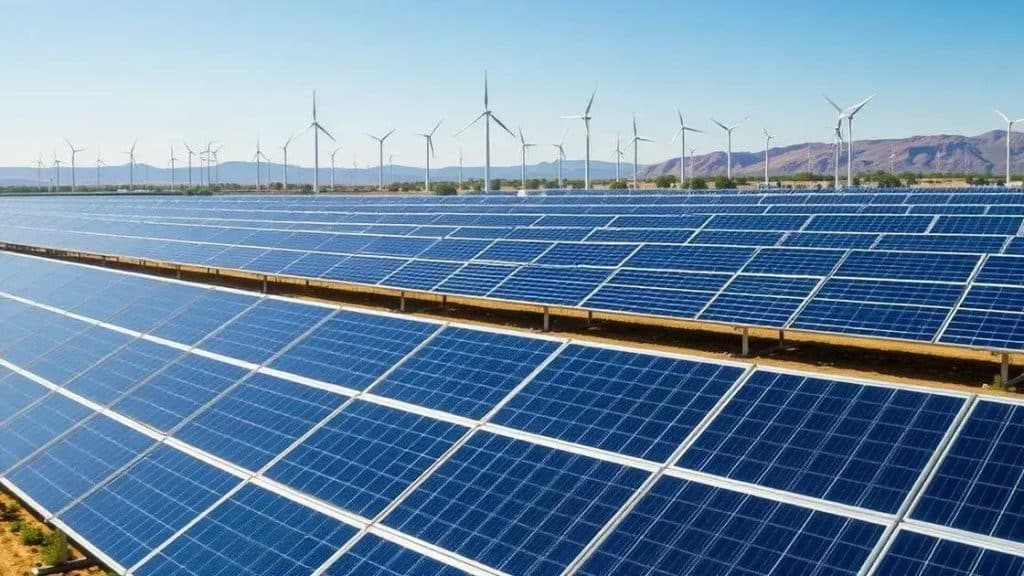Renewable energy investment growth: why it matters now

Anúncios
Renewable energy investment growth is driven by technological advancements, government support, and increasing consumer demand, making it a vital sector for sustainable development and economic opportunities.
Renewable energy investment growth is increasingly shaping our economic landscape. Have you noticed how businesses are shifting towards greener alternatives? Let’s dive into why this growth is vital.
Anúncios
Current trends in renewable energy investments
Understanding the current trends in renewable energy investments is essential for anyone looking to navigate this evolving landscape. The focus on sustainability has increased significantly, prompting businesses and governments to shift their attention toward greener alternatives. As a result, many innovative technologies are emerging.
Investment Growth Areas
Two main areas are leading the charge in growth:
Anúncios
- Solar energy: With the decreasing costs of solar panels, investment in solar energy has seen remarkable increases, making it a primary choice for many.
- Wind energy: Expanding wind farms, both onshore and offshore, have attracted significant funding due to their effective energy production capabilities.
- Energy storage: Advances in battery technology are helping to close the gap between energy generation and consumption, making this area attractive for investors.
This growth is not only driven by technological advancements but also by the increasing public awareness of climate change and the necessity for clean energy solutions. Investors are recognizing renewable energy as a viable opportunity for long-term growth, as fossil fuel dependence continues to decline.
Government Initiatives
Government policies play a crucial role in shaping investment trends. Incentives like tax breaks and subsidies have proven to encourage more investments in the renewable sector. For instance, various countries have introduced ambitious renewable energy targets to enhance their commitment to sustainability. These initiatives create a favorable environment for investors.
Furthermore, partnerships between public and private sectors are becoming increasingly common. Such collaborations can lead to the development of cutting-edge projects, benefiting both the economy and the environment.
The global push for net-zero emissions has transformed the landscape for renewable energy investments. As companies strive to meet these goals, they are reassessing their portfolios and shifting resources toward sustainable initiatives. This transformation signals a profound shift in corporate responsibility, aligning business practices with environmental stewardship.
Consumer Impact
As investments in renewable energy continue to surge, consumers are also feeling the benefits. Lower energy costs and greater availability of clean energy options are reshaping the market landscape. This shift not only helps the environment but also empowers consumers to make informed choices about their energy sources.
In summary, the current trends in renewable energy investments reflect a significant shift toward sustainability driven by technology, policy, and consumer demands. As this sector evolves, staying informed on these trends is essential for maximizing potential opportunities.
Key benefits of investing in renewable energy

Exploring the key benefits of investing in renewable energy reveals why this sector is capturing attention worldwide. Investors are increasingly recognizing the potential for not just financial returns, but also positive environmental impacts.
Economic Advantages
Investing in renewable energy can lead to numerous economic benefits. First, it often creates more jobs, as new projects require skilled workers. Additionally, the cost of renewable technologies has decreased significantly, making them more viable than ever. For instance, solar and wind power create competitive prices against traditional energy sources.
- Job creation: New installations and maintenance generate employment opportunities.
- Energy independence: Local renewable energy diminishes reliance on imported fossil fuels, boosting the economy.
- Long-term savings: Lower operational costs lead to significant savings over time.
Furthermore, many governments offer incentives for renewable projects, ensuring that investors enjoy additional benefits. These incentives can range from tax breaks to grants, making investment even more appealing.
Environmental Impact
The environmental benefits are another critical aspect of renewable energy investments. By shifting away from fossil fuels, investors contribute to a reduction in greenhouse gas emissions. This transition plays a pivotal role in combating climate change, making it a significant factor for many.
Moreover, many consumers prefer eco-friendly options. As awareness grows, companies that prioritize sustainability can enhance their public image and attract a loyal customer base. This trend not only supports the planet but can also lead to increased profits.
Investors are also recognizing that renewable energy sources are more resilient to market changes than traditional fossil fuels. As global policies increasingly favor greener energy solutions, investments in renewables are likely to produce stable returns in the long run.
Social Benefits
Last but not least, there are social benefits tied to renewable energy investments. Communities that invest in local renewable resources often experience revitalization. This can lead to improved public health and better living conditions for residents, as cleaner air and water are created.
In summary, the key benefits of investing in renewable energy extend beyond financial returns. They encompass economic growth, environmental stewardship, and community wellness, making them imperative in today’s world.
Challenges faced by investors in renewable energy
Investing in renewable energy comes with its own set of challenges that can impact investors’ decisions. Understanding these challenges faced by investors in renewable energy is crucial for navigating the sector effectively.
Regulatory Hurdles
One major challenge is the regulatory landscape. Different regions have varying laws and incentives for renewable energy projects. This inconsistency can create confusion for investors. Regulations might change frequently, making it hard to plan long-term investments. Some investors may hesitate to commit funds when they feel uncertain about future policies.
- Changing regulations: Frequent shifts in laws can create instability.
- Lack of standardization: Different states or countries may have unique requirements.
- Permitting delays: Lengthy approval processes can slow down project initiation.
This regulatory environment requires investors to conduct thorough research before committing to projects. Seeking local expertise can help mitigate these risks.
Financial Risks
Another challenge involves financial risks associated with renewable energy investments. Initial costs for projects may be high, and while costs are decreasing, some technologies still require substantial upfront investment. Investors often worry about recovering these costs if the project does not perform as expected.
Additionally, fluctuations in energy prices can impact returns on investments. For instance, if traditional fossil fuel prices drop significantly, renewable options may struggle to compete. This volatility can make investors hesitant.
Technological Uncertainties
Investors also face technological uncertainties in renewable energy. While advancements are rapid, not all technologies prove reliable or cost-effective. For example, newer solar or wind technologies may offer promises of efficiency but don’t always deliver in real-world applications.
This uncertainty can lead to increased risk. Investors must carefully evaluate the performance history of emerging technologies before deciding where to allocate funds. Staying informed about innovations can help reduce risks.
In exploring the challenges faced by investors in renewable energy, it becomes clear that thorough research and understanding of the market dynamics are essential. Awareness of regulations, financial implications, and technological developments can empower investors to make informed decisions.
Future outlook for renewable energy investments

The future outlook for renewable energy investments is bright and promising. As technology evolves, many experts believe that the market for renewable energy will see continued growth. This trend is primarily driven by environmental concerns and the urgent need for sustainable energy sources.
Technological Innovations
One key factor influencing the future is the pace of technological innovations. New advancements in solar, wind, and energy storage technologies are making renewable energy more efficient and affordable. For example, improved solar panel efficiency is allowing for more energy capture from the same surface area. Innovations such as floating wind farms enable energy generation in deeper waters, where winds are stronger.
- Improved efficiency: New tech is making energy capture better.
- Cost reduction: Advances are driving down costs across the sector.
- Storage solutions: Better batteries are key for managing energy use.
As these technologies continue to improve, more investors are likely to enter the market, eager to capitalize on the potential for high returns.
Government Policies and Support
Another significant aspect of the future outlook is government policies. Many countries are setting ambitious renewable energy targets. These targets often include commitments to reduce greenhouse gas emissions dramatically. Governments are also providing incentives to encourage investments in renewable projects. These policies not only support existing firms but also attract new players into the market.
This enhancement of favorable policy frameworks creates a stable investment environment. Investors are likely to feel more secure knowing that governments are committed to promoting renewable energy.
Market Demand
Public demand for clean energy continues to rise, further driving the sector’s growth. Consumers are becoming more conscious of their energy choices and are actively seeking greener options. Companies are responding to this demand by committing to sustainability goals and implementing renewable energy solutions in their operations.
As more consumers advocate for sustainable practices, the market for renewable energy will likely expand. Increased demand can lead to greater investment opportunities, which is a compelling incentive for investors looking to enter the renewable energy landscape.
In summary, the future outlook for renewable energy investments appears encouraging, with technological advancements, supportive government policies, and rising market demand converging to reshape the energy landscape positively.
FAQ – Frequently Asked Questions about Renewable Energy Investments
What are the main benefits of investing in renewable energy?
Investing in renewable energy provides economic growth, job creation, and a positive environmental impact, making it an attractive opportunity.
What challenges do investors face in the renewable energy sector?
Investors may encounter regulatory hurdles, financial risks, and technological uncertainties that can complicate their investment decisions.
How does government policy affect renewable energy investments?
Supportive government policies, including incentives and regulations, can create a favorable environment that encourages investments in renewable energy.
What is the future outlook for renewable energy investments?
The future looks promising due to ongoing technological advancements, increasing public demand for clean energy, and supportive policies.





